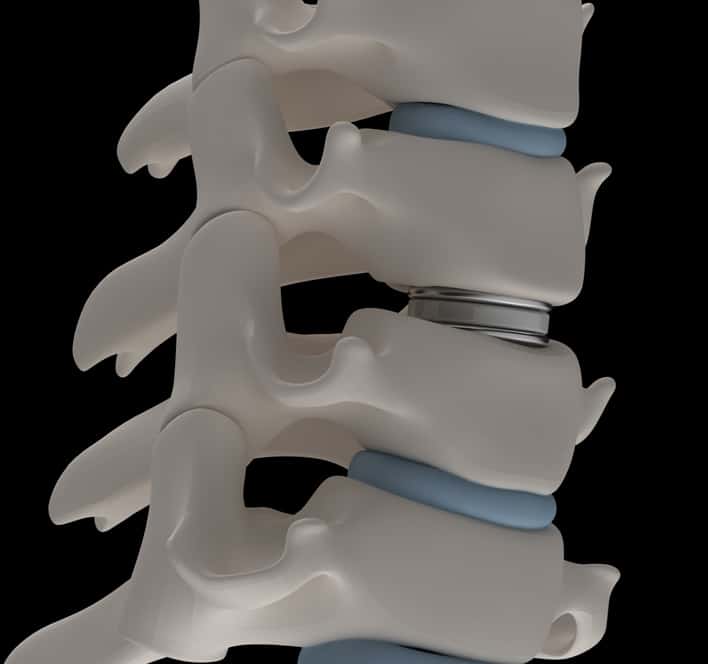Cervical disc replacement is a common surgery performed to help relieve nerve compression in the neck. This procedure is fairly reliable and safe to treat radicular pain that spreads from the neck down into the hand and arm.
While spine and back specialists will often recommend somewhat different postoperative care approaches following a cervical disc replacement procedure, there are a few basic aspects of recovery that you can expect. Our spinal specialists at NJ Spine & Orthopedic can help you know what to expect in the weeks and months following the procedure. We will assist you in recovering without complications and setbacks.
What Is a Cervical Disc Replacement?
This is a surgical procedure that a spine surgeon performs to remove and replace a damaged spinal disc. This disc may not be functioning properly anymore or it may be causing other complications or health issues, like pressure on your spinal cord and nearby nerves.
The surgeon will provide you with a general anesthetic for a cervical disc replacement. They’ll also need to make an incision to get to the damaged disc. Once they’ve gained access, they’ll remove either fragments of the disc or the entire damaged disc and will place a new disc.
Recovering From Cervical Disc Replacement
Most individuals can get back to their day-to-day activities, like driving and light work, within a week of their cervical disc replacement procedure. A full recovery could potentially take anywhere from six to 12 weeks when you’ll be able to resume more vigorous activities and heavier lifting.
Week One
During your first week after cervical disc replacement, the most important thing for you to do is rest. Your body will be healing and recovering from the surgery during your first week. This process will naturally drain you of energy and you’ll likely feel fatigued and sore. It’s an important part of the healing process.
It’s highly recommended that you take the whole first week (or at least the first few days) off from work to ensure you’re giving your body the rest it needs for a proper recovery.
After Week One
After your first week of recovery and going into your second week, you should begin feeling your energy coming back. You should also notice a significant reduction in discomfort from your surgery at this point. You may even notice a decrease in the numbness, pain, and tingling from the former nerve compression or it will be gone entirely.
You should have no problem returning to work if you work in a job that requires light duties, but only with your surgeon’s approval. It’s essential that you listen to what your body is telling you and not overdo it. If your job requires you to sit for long periods of time, you’ll want to get up regularly to gently stretch your body out. If you can, get the circulation moving by walking around a bit.
Just remember, that you may start feeling better, but you still don’t want to overtax yourself. You’ll still need to follow your surgeon’s directions exactly on various activities you’ll need to avoid or lifting restrictions until you’re fully healed.
Factors That Can Slow Down Recovery Time
While each person’s recovery from cervical disc replacement will vary, there are certain factors that can impact recovery time, including:
Smoking
Research shows that individuals who smoke seem to have higher rates of surgical site infections. Often, spinal surgeons will require their patients to stop smoking in the few weeks that lead up to and follow their procedure.
Medication
If you don’t take your medications as prescribed by your spinal specialist or pharmacist, it can increase your risk of delayed recovery due to inadequate pain relief or complications.
Multilevel Surgery
When your surgeon operates on more than one cervical spine level, it typically will result in a longer recovery period than with a single-level procedure.
Age
Older individuals might not heal as fast. A study of cervical disc replacement procedure outcomes compared individuals who were over 65 years old with individuals who were younger than 40. Although both group outcomes were good, individuals over 65 years old tended to experience more problems with swallowing following surgery.
Reach Out to NJ Spine & Orthopedic to Speak With a Skilled Cervical Disc Replacement Surgeon
Your cervical disc replacement recovery time will vary depending on your individual situation and condition. It will also depend on the location of the damaged disc, how quickly you tend to heal in general, and how much nerve compression occurred.
It’s important you reach out to NJ Spine & Orthopedic if you have questions for our experienced spine and back surgeons about cervical disc replacement or about any of our other spinal and orthopedic services. We’ll answer all your questions, address any concerns, and get right to work on creating a recovery plan that’s tailored for you specifically. Call us today at (866) 553-0612 or fill out our online contact form to learn more and schedule an appointment. Our Concierge Team is also here to help streamline your treatment.

